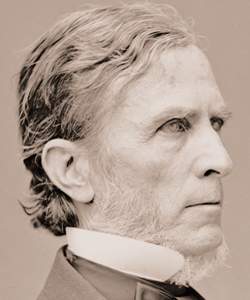William Pitt Fessenden, Abolition and Secession (American National Biography)
Scholarship
Although not an abolitionist like his controversial father, Fessenden disliked slavery and opposed its expansion. He very soon actively organized the Anti-Nebraska coalition in Maine and, in the summer of 1855, quit the Whig party to join the Republicans, "that great Northern movement which I believe to be essential to the future welfare of the country" (Jellison, p. 86). As a leading Republican in the Senate, Fessenden was in the forefront of the struggle to make Kansas a free state, and in the process he became Stephen Douglas's nemesis, forever challenging him in debate. Indeed, Douglas was forced to concede that, among the great orators of the mid-nineteenth century, such as Henry Clay, John C. Calhoun, and Webster, Fessenden was "the readiest and ablest debater" (Jellison, p. 95). In 1857 Fessenden contracted a form of malaria, and his health remained poor the rest of his life. In addition, his wife died in 1857. As a result of his prominent role in the forensic wrangling over the Lecompton constitution and his work on the Finance Committee, Fessenden was reelected in 1859 by a heavily Republican Maine legislature. After Abraham Lincoln's election, Fessenden was one of the most adamant Republicans in urging the administration to stand firm against southern threats to secede. Even after his state selected him to attend the Washington Peace Conference at Willard's Hotel in February 1861, he was so unwilling to consider concessions that he refused to attend.
Michael Perman, "Fessenden, William Pitt," American National Biography Online, February 2000, http://www.anb.org/articles/04/04-00371.html.
William Pitt Fessenden, Civil War (American National Biography)
Scholarship
As the new chair of the Finance Committee, Fessenden played a large part in the financing of the war. A conservative in financial matters, he believed in hard money and in a "pay as you go" approach to raising cash for the war effort. Initially he raised the level of duty in the Morrill Tariff of 1860 to generate specie through increased customs receipts. He hoped to increase revenues still further through taxation, especially on personal incomes, but Salmon P. Chase, the secretary of the treasury, preferred to rely on other means…Chase relied on loans financed by government bonds and Treasury bills; on legal tender notes, paper money called "greenbacks"; and on a new national banking system. Fearing that the national banks would destroy the existing state banks and the "greenbacks" and the loans would produce massive inflation, Fessenden nevertheless helped to enact Chase's proposals. He tried constantly to rein in the amounts requested that would be inflationary and encouraged greater reliance on revenue from customs duties and taxation. Meanwhile, on the war itself, Fessenden supported the creation of the Joint Committee on the Conduct of the War and fretted over the lack of aggressiveness of the administration and its generals. Although he was a member of the Republican caucus delegation that met with Lincoln in December 1862 to complain that he was getting poor military advice from his cabinet, he refused to join the radicals in the party in demanding confiscation and emancipation.
Michael Perman, "Fessenden, William Pitt," American National Biography Online, February 2000, http://www.anb.org/articles/04/04-00371.html.
William Pitt Fessenden (Congressional Biographical Directory)
Reference
FESSENDEN, William Pitt, (brother of Samuel Clement Fessenden and Thomas Amory Deblois Fessenden), a Representative and a Senator from Maine; born in Boscawen, Merrimack County, N.H., October 16, 1806; attended the common schools; graduated from Bowdoin College, Brunswick, Maine, in 1827; studied law; admitted to the bar in 1827 and practiced in Bridgeton, Bangor, and Portland, Maine; member, State house of representatives in 1832 and 1840; elected as a Whig to the Twenty-seventh Congress (March 4, 1841-March 3, 1843); declined to be a candidate for reelection in 1842; member, State house of representatives 1845-1846; unsuccessful Whig candidate for election to the Thirty-second Congress; member, State house of representatives 1853-1854; elected as a Whig to the United States Senate to fill the vacancy in the term beginning March 4, 1853, caused by the failure of the legislature to elect; reelected in 1859 as a Republican and served from February 10, 1854, to July 1, 1864, when he resigned to accept a Cabinet appointment; chairman, Committee on Finance (Thirty-seventh through Thirty-ninth Congresses); appointed Secretary of the Treasury by President Abraham Lincoln and served from 1864-1865; member of the peace convention of 1861 held in Washington, D.C., in an effort to devise means to prevent the impending war; again elected to the United States Senate as a Republican and served from March 4, 1865, until his death in Portland, Maine, September 8, 1869; chairman, Committee on Public Buildings and Grounds (Fortieth Congress), Committee on Appropriations (Forty-first Congress), Committee on the Library (Forty-first Congress); originally interred in Western Cemetery in Portland, Maine; later reinterred in an unmarked grave in the Fessenden family plot in Evergreen Cemetery.
“Fessenden, William Pitt,” Biographical Directory of the United States Congress, 1774 to Present, http://bioguide.congress.gov/scripts/biodisplay.pl?index=F000099.



